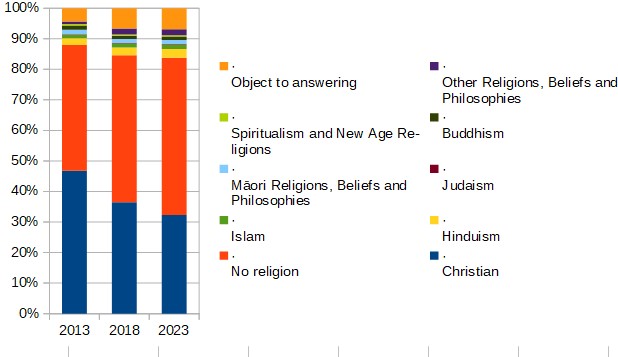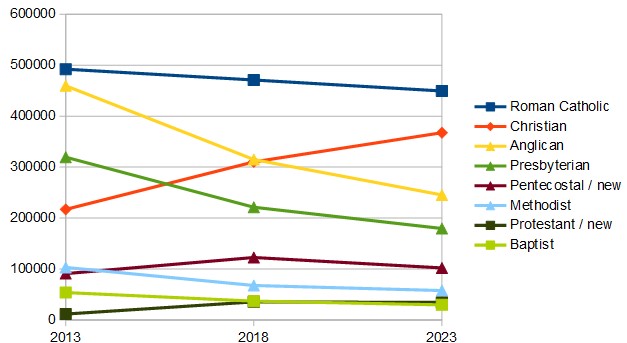While Anglicans should be regarded as Christians as well, for the first time there were more Christians in New Zealand who wanted to be just known as Christian, rather than Anglican. There were 364,644 who identified as just Christian and 245,301 as Anglicans. The number of Anglicans has been rapidly dropping in recent years, while the number of Christians has been steadily increasing. Most other large denominations / groupings have also seen a decline. Compared to the Anglican decline of about 22%, Baptists lost 20%, Presbyterians 19%, Pentecostals 17%, Methodists 15%, Catholics 4.5% and New Protestants 3.3%. I used the New Protestant label for denominations that have split off from a traditional Protestant Church fairly recently. Overall, these newer denominations for the moment at least seem to be steady, though possibly people attending these may be more ready to use a simple “Christian” or “Jesus-follower” label. Among the Pentecostals there was quite some movement, both up and down, in the different denominations, possibly as people go to join the next “in” church and leave behind what was considered alive just a few years ago. The simple Christian is the only main Christian group that has significantly grown (18% since 2018).
On the one had that is quite encouraging. People no longer put a great emphasis on the things that divide us as Christians, but simply are keen to follow Jesus, to be part of the broader witness to Jesus Christ in the world. On the other hand it may indicate less of an identification with the local church – Christians at large, who may not be anchored in a Church.
Does this mean that the Anglican Church, too, should emphasize more that it is part of the global Christian Church, rather than try to distinguish itself as uniquely Anglican? Is there a church union of the Spirit happening, but not one of structure and organisation?
While it is not as negative as the figures at a first glance indicate, the importance of Christianity is clearly declining. Indeed, Christianity as a whole was the only grouped religious affiliation that reduced, with numbers for “no religion” (+14%), Buddhism, Hinduism, Islam, Judaism, Māori Beliefs, Spiritualism, “Other Religions and Philosophies”, and “Decline to Answer” all increasing. The largest increase was seen among Sikhs. It is also noticeable that Māori beliefs are increasing significantly – and not the syncretistic churches like Rātana – but rather forms that probably seek to recover some pre-Christian version of Māori beliefs.
While immigration affects the changes in the religious landscape, there clearly is also a turn away from a Christian worldview to others. Now more than at other times, Christians need to be aware that they are really just a minority in New Zealand. But it is exactly in times such as these that we are called to give an account of the hope that is within us and show the importance of Jesus Christ in our lives.


